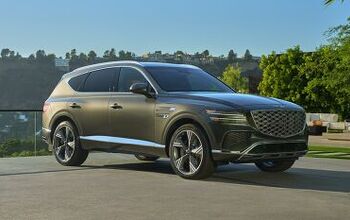Automotive Industry Annoyed China Gets to Decide What Engines It Offers

With the possible exception of the United States in the near future, emission regulations are getting harsher everywhere. Nowhere is that more true than China. Not only does Asia’s most populous country have some of the most stringent emission requirements for new cars, it also has the strictest sales quotas for electrically powered vehicles on the planet. Too strict, according to some automakers.
A Chinese draft regulation issued last week stipulates automakers must sell enough electric or plug-in hybrid vehicles to comprise 8 percent of total volume by 2018, 10 percent by 2019, and 12 percent by 2020. This comes after talks between Chinese Premier Li Keqiang and German Chancellor Angela Merkel that hinted China might have mercy on Germany manufacturers.
While Volkswagen has pleaded for China to reconsider the timeline, it has specified that it would adhere to the 2018 standards if forced to do so. Meanwhile, BMW flat-out said it couldn’t.
“Just like all the others, we were below 6 percent last year, and I mean significantly below,” BMW China chief Olaf Kastner told Automotive News China in the country where the carmaker has a joint venture with Brilliance China Automotive Holdings.
However, it’s not just German automakers that should be concerned. Most major manufacturers are trying to establish strong global sales while targeting China as a part of that endeavor. But the rules are different in China. Not only do companies have to get into bed with a Chinese firm just to do business inside the country, the stiff regulations are shaping the type of cars they can sell. The only way to stop this from influencing the sort of vehicles automakers sell worldwide is to have region-specific models, abandon the Chinese market, or play ball and offer more BEVs or plug-ins immediately.
According to Reuters, the most recent legislative draft by China’s Ministry of Industry and Information Technology is open for public comment until June 27. German Chancellor Angela Merkel announced at the start of the month that China had agreed to concessions on the timeline of quotas, but the most current draft does not reflect that. It’s unchanged from one issued in September, with no alterations relating to the proposed Merkel rescheduling.
Dominik Declercq, China’s representative for the European Automobile Manufacturers Association, said the new draft indicated China definitely had not changed its mind on the issue. “That’s what it looks like: no compromise, no concession,” Declercq explained.

A staunch consumer advocate tracking industry trends and regulation. Before joining TTAC, Matt spent a decade working for marketing and research firms based in NYC. Clients included several of the world’s largest automakers, global tire brands, and aftermarket part suppliers. Dissatisfied with the corporate world and resentful of having to wear suits everyday, he pivoted to writing about cars. Since then, that man has become an ardent supporter of the right-to-repair movement, been interviewed on the auto industry by national radio broadcasts, driven more rental cars than anyone ever should, participated in amateur rallying events, and received the requisite minimum training as sanctioned by the SCCA. Handy with a wrench, Matt grew up surrounded by Detroit auto workers and managed to get a pizza delivery job before he was legally eligible. He later found himself driving box trucks through Manhattan, guaranteeing future sympathy for actual truckers. He continues to conduct research pertaining to the automotive sector as an independent contractor and has since moved back to his native Michigan, closer to where the cars are born. A contrarian, Matt claims to prefer understeer — stating that front and all-wheel drive vehicles cater best to his driving style.
More by Matt Posky
Latest Car Reviews
Read moreLatest Product Reviews
Read moreRecent Comments
- Dave M. I'm sorry to see any storied name go away. The lifespan of the Malibu has fit perfectly in my lifetime years-wise. Some of the highlights include the first and second generations, the '78 revamp (very clean design), and the 2005 generation. Ford, GM and Mopar gave this segment away by allowing Toyota and Honda a foot in the door and then always having to play catch-up. How hard is it to make a truly competitive sedan at a profit? Obviously, Japan Inc. figured it out.I've driven a few rentals these past years; the Malibu got the job done but honestly the Passat and Altima were my rental preferences.
- Kcflyer actually yes. It's a shame that a product this uncompetitive can still outsell GM's entire EV offerings. Those products have had billions thrown at them. Imagine how nice the new Malibu, Impala, SS, and Lacrosse would be with that kind of commitment.
- 3SpeedAutomatic Nope....
- Bd2 Looking forward to flooding the rental lots with Hyundai and Kia models, this is just one obstacle now eliminated.
- Kcflyer keep the color. lose the stupid front design. make it reliable, at least as reliable as a base 911. Then and only then is it somewhat worthy of that price.


































Comments
Join the conversation
China gets the majority of its electric from coal, so I'm not sure mandating electric vehicles is all that helpful in fighting pollution or carbon emissions. https://en.wikipedia.org/wiki/Electricity_sector_in_China
firstly, we should all be grateful for the Chinese consumer, otherwise you would be stuck with s...y little eurohatchs or cramped little USA barges. Chinese come with added length. stretched Nissan Altima check stretched Hyundai Sonata check Malibu that aren't cramped at the back check it took China style to get Americans decent rear leg room in mid range cars. China like their cars longer than Americans. now the changes that China are proposing are big, basically USA federal CAFE and CARB state ZEVs all rolled together. basically China jumps to CARB level ZEV next year, for the companies not prepared, too bad, they can stop production until they buy enough credits or sell enough NEVs. This will be tough on the Germans and the Japs, GM should be OK. Also expect a lot of 48V mild hybrids, a lot. and just like CARB the percentages are crap, they are actually nominal so a PHEV is about 2 units and a EV is about 4 units, so roughly divide by 3 to get approximate requirements, so 12% is really about 4%. not hard for many Chinese car companies.